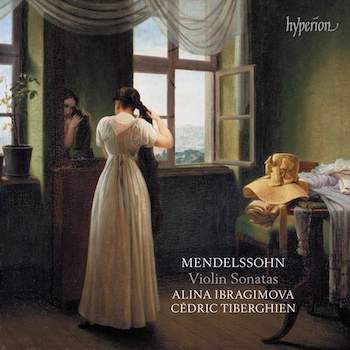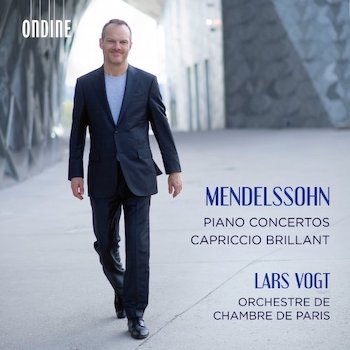Classical Album Reviews: Mendelssohn Violin Sonatas and Piano Concertos
By Jonathan Blumhofer
Some substantial works by composer Felix Mendelssohn remain overlooked.
 In general, Felix Mendelssohn isn’t a composer much in need of advocacy. His symphonies, concerti, oratorios, and much of his chamber output are all firmly established in the repertoire. Yet, here and there, are some substantial works that remain overlooked, including the four pieces for violin and piano that are surveyed in this new release from violinist Alina Ibragimova and pianist Cédric Tiberghien.
In general, Felix Mendelssohn isn’t a composer much in need of advocacy. His symphonies, concerti, oratorios, and much of his chamber output are all firmly established in the repertoire. Yet, here and there, are some substantial works that remain overlooked, including the four pieces for violin and piano that are surveyed in this new release from violinist Alina Ibragimova and pianist Cédric Tiberghien.
To be sure, they’re varied in depth and quality. The earliest, a Sonata in F major from 1820, is essentially a student piece. Its seams show: even players of Ibragimova’s and Tiberghien’s caliber can only do so much to redeem its thin textures, square phrases, and dutiful development of ideas.
That said, the duo makes the most of the music’s considerable charms: the opening Allegro is fresh and lithesome and its central Andante proceeds nobly. Best is the elfin finale with its playful series of starts and stops that the pair bring whimsically to life – a sparkling foreshadowing of the Midsummer Night’s Dream Overture and Octet that would follow just a few years later.
They’re reading of the more substantial F-minor Sonata (op. 4) is likewise characterful. Written in 1823, the score shows the influence of Beethoven, both in its darker tone and through some of its textures and gestures (especially in the Poco Adagio). Ibragimova and Tiberghien deliver their parts with warmth and flexibility. While they underline the elegant, songful first movement’s “moderato” tempo marking a bit generously, the middle one is beautifully shaped and the finale swaggers gently.
The most striking piece here, though, is another F-major Sonata, this one written in 1838. Evidently Mendelssohn intended to revise it before sending it to the printer but died in the meantime; it wasn’t published until 1953 – and then in bowdlerized form. Only in 2009 did a definitive edition become available.
The end result is a beautiful piece, much in the same spirited vein as the slightly later Cello Sonatas. Ibragimova and Tiberghien offer an incisive, articulative account of its big first movement, one that never lacks for momentum or color. The exchanges of foreground and background roles in the central Adagio flow beautifully while the concluding Assai vivace is brilliantly felt, its episodes of tension and release unfolding with utter naturalness.
Rounding out the album is a fragment of a Violin Sonata in D that the composer left incomplete sometime in the late 1820s. It’s a tantalizing sketch, with a warm-hearted Adagio introduction followed up by a stormy fast section, but not much more – though Ibragimova and Tiberghien get its closing bars to shimmer.
 Mendelssohn’s two piano concerti have, perhaps, a few strikes against them: not being so expansive as Chopin’s, flashy as Liszt’s, or probing as Brahms’s. Even so, when played right, they more than justify themselves. That’s just what happens in Lars Vogt’s new traversal of the pair with the Orchestre Chambre de Paris (OCP).
Mendelssohn’s two piano concerti have, perhaps, a few strikes against them: not being so expansive as Chopin’s, flashy as Liszt’s, or probing as Brahms’s. Even so, when played right, they more than justify themselves. That’s just what happens in Lars Vogt’s new traversal of the pair with the Orchestre Chambre de Paris (OCP).
The German pianist’s approach to both pieces is firmly unsentimental: he doesn’t linger unduly over any of their turns of phrase or, as some might, milk their lyricism for superficial effect. Rather, he lets the music speak on its own terms; when played with the sense of purpose and attention to detail Vogt and Friends bring to it here, the results are riveting.
In the G-minor Concerto (No. 1), Vogt’s articulations of the solo part are always clean and driven. His playing in the first movement ably balances the music’s moments of storminess and repose, while the lovely Andante unfolds with beguiling warmth. The finale is particularly visceral, its rhythmic figurations snapping and textures discreetly shaded. Taken together with the OCP’s shapely accompaniments, this is a Mendelssohn First Concerto of considerable purpose and meaning: it is lived in – and for – the moment.
Much the same can be said of the D-minor Concerto (No. 2). Here, the first movement sounds ever unsettled and surging. Vogt’s playing of the solo line is tautly focused and the orchestral contributions flow smartly. The slow movement serves as a serene oasis between this and the strictly-dancing finale, the latter marked by astonishingly clean filigree and a bracing sense of musical direction.
Given Vogt’s brisk tempos and the brevity of both concerti, the disc’s runtime is short, indeed (both of those works total only about forty minutes). Accordingly, one might expect the album to be filled out by the rest of Mendelssohn’s music for piano and orchestra. Alas, that hope is just partially borne out – we get a crisp, fluent account of the Capriccio brilliant – but nothing more. That’s a bit of a shame and one hopes that Vogt will return soon with the Rondo brilliant and the Serenade & Allegro giocoso.
Still, what’s here is invigorating. Vogt and the OCP clearly have something to say with this music – and it’s well worth hearing.
Jonathan Blumhofer is a composer and violist who has been active in the greater Boston area since 2004. His music has received numerous awards and been performed by various ensembles, including the American Composers Orchestra, Kiev Philharmonic, Camerata Chicago, Xanthos Ensemble, and Juventas New Music Group. Since receiving his doctorate from Boston University in 2010, Jon has taught at Clark University, Worcester Polytechnic Institute, and online for the University of Phoenix, in addition to writing music criticism for the Worcester Telegram & Gazette.
Tagged: Alina Ibragimova, Cédric Tiberghien, Hyperion Records
